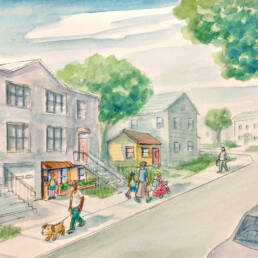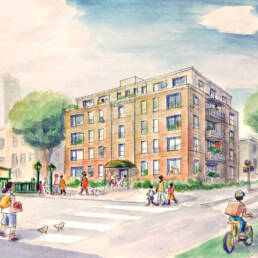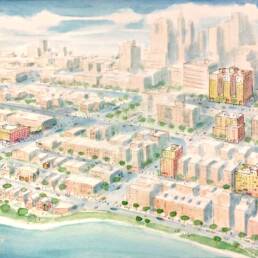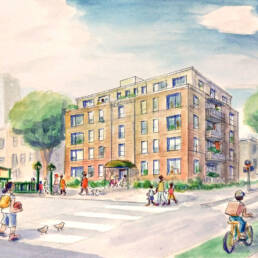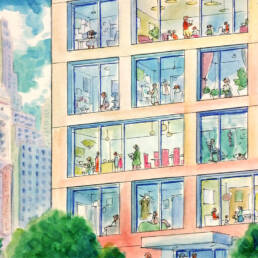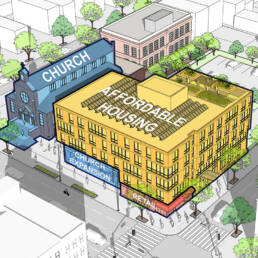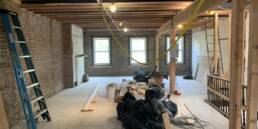New York City is undergoing a significant shift in housing policy with the City of Yes for Housing Opportunity initiative. This bold plan aims to modernize outdated zoning laws, promote housing growth, and create a more inclusive urban landscape. Whether you’re a resident, investor, or policymaker, understanding these changes is crucial for navigating the city’s evolving real estate environment, especially for those involved in renovation designs and urban development.
What is the City of Yes for Housing Opportunity?
The City of Yes for Housing Opportunity is a comprehensive zoning reform initiative spearheaded by the New York City Department of City Planning (DCP). It is designed to address New York’s housing crisis by:
- Encouraging new housing development in areas where restrictive zoning has historically limited growth.
- Expanding affordable housing options to meet the needs of a growing population.
- Simplifying outdated zoning rules to make building multi-family homes and accessory dwelling units (ADUs) easier and undertake strategic renovation designs.
- Supporting transit-oriented development to create sustainable, walkable communities.
These updates are expected to create thousands of new housing units, alleviate supply shortages, improve affordability across the city, and make it more livable, inclusive, and economically vibrant
The Driving Forces Behind the Initiative
Several key factors have necessitated the ‘City of Yes’ reforms:
- Soaring Housing Costs: New York City’s rental prices have reached remarkable highs, making it increasingly difficult for residents to afford housing.
- Limited Housing Supply: Decades-old zoning laws restrict development, leading to a severe mismatch between demand and available housing.
- Economic Recovery Needs: Post-pandemic revitalization efforts call for job creation and increased investment in urban development.
- Environmental Sustainability: The city aims to reduce reliance on car-centric development and promote transit-oriented communities.
Key Proposals of the Initiative
- Eliminating Density Caps: Current zoning regulations limit housing density in many neighborhoods, even in areas well-served by public transit. The new proposal amends these restrictions, allowing for more efficient land use.
- Accessory Dwelling Units (ADUs) Legalization: Homeowners can build basement apartments, backyard cottages, or convert garages into livable spaces. This expansion creates new rental options while supporting multi-generational families and renovation designs.
- More Housing Near Transit Hubs: The plan encourages multi-unit developments near subway stations and major bus routes to maximize accessibility and reduce reliance on cars.
- Reforming Parking Requirements: Minimum parking requirements for new developments often reduce the feasibility of housing projects. Removing or relaxing these conditions will free up space for additional residential units.
- Adaptive Reuse of Buildings: The initiative facilitates the transformation of underutilized commercial properties, such as older office buildings, hotels, and retail spaces, into residential units. This presents significant opportunities for renovation designs to breathe new life into existing structures.
- Expanded Incentives for Affordable Housing: Developers who include affordable housing units will receive additional floor area bonuses and streamlined approvals. This ensures that new developments contribute to a more economically diverse housing market.
How Will This Impact NYC Residents?
The City of Yes initiative will have widespread benefits, including:
- Increased Housing Supply: One of the core objectives of the initiative is to allow for greater housing density in high-demand areas. This includes upzoning select neighborhoods to support taller buildings, reducing minimum lot size requirements, and allowing conversions of underutilized spaces into residential units through renovation designs.
- More Diverse Housing Options: The ‘City of Yes’ initiative removes zoning constraints to make building multi-family units, ADUs, and transit-friendly housing options easier. New small apartments, duplexes, and ADUs will cater to different household sizes and incomes.
- Greater Affordability: Expanding affordable housing units and options will help combat rising costs.
- Enhancing Transit-Oriented Development: By focusing on transit-oriented development, the city aims to build more housing near subway stations, bus routes, and other mass transit infrastructure. This will improve accessibility and reduce traffic congestion and carbon emissions.
- Encouraging Mixed-Use Developments: The initiative promotes mixed-use zoning, where residential, commercial, and retail spaces coexist. This approach enhances walkability, reduces the need for extensive commuting, and fosters vibrant neighborhood economies.
- Economic Growth and Job Creation: Increased housing construction boosts employment opportunities, benefiting construction workers, architects, engineers, and real estate professionals. Additionally, mixed-use developments generate more local businesses and retail activity.
Challenges and Concerns
While the initiative brings many positives, it also faces opposition and challenges, such as:
- Community Resistance: Some neighbors worry about increased density and changes to their neighborhood character.
- Infrastructure Strain: More housing means greater demand for public services like schools, transportation, and utilities.
- Implementation Hurdles: Rezoning processes and bureaucratic delays could slow progress.
The city has responded by emphasizing that the zoning changes are designed to work differently in different neighborhoods, aiming to balance development with community needs. Thoughtful renovation designs and community involvement in significant projects can help alleviate or address these concerns.
The Future of NYC Housing
NYC’s City of Yes for Housing Opportunity is a transformative initiative poised to reshape the city’s real estate landscape. The plan aims to create a more inclusive, affordable, and sustainable New York by modernizing zoning laws and fostering intelligent development.
This initiative presents exciting opportunities for homeowners, developers, and investors to engage in renovation designs that align with evolving zoning policies. If you’re considering a home purchase, investment, or development project in NYC, now is the time to stay informed. Have questions about how these changes might affect you? Reach out for expert insights on navigating the evolving NYC housing market.

